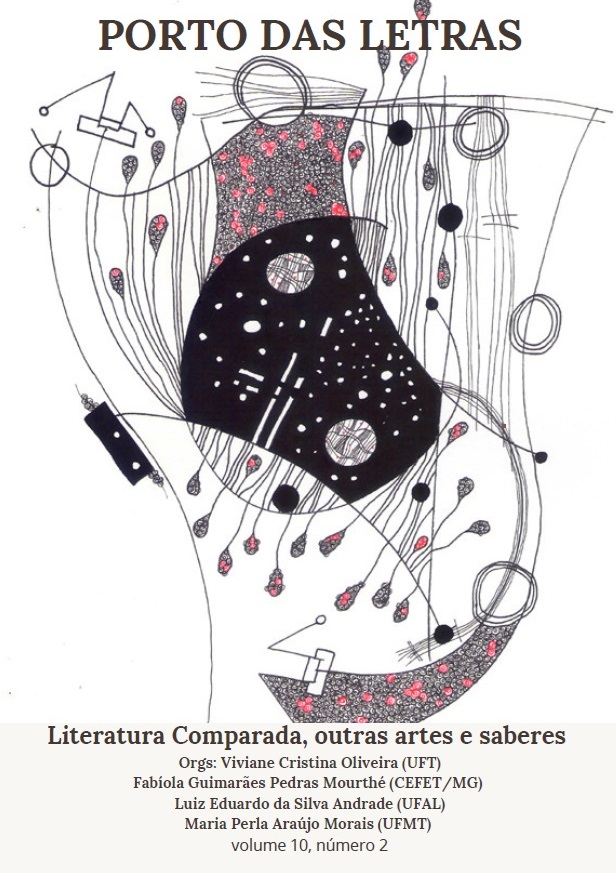Geography and literature in Richard Wright's Black Boy (American Hunger)
DOI:
https://doi.org/10.20873.24214Abstract
The autobiographical narrative Black Boy (American Hunger): records of childhood and youth, by Richard Wright, is divided into two parts: in the first one, “Southern night”, the author-narrator-character handles his experience of childhood in the South of United States; in the second one, “The horror and the glory”, his experience of moving to Chicago, in the north, is covered. The formal division is also a geographical division between south and north and, from this discursive arrangement, a symbolic field referring to History of Civil War between the agricultural and enslaving south and the industrialized north raises. Given this context, narrative fabrics are built up expressing imaginary construction about north: on one hand, the north as a place of possibilities to black community, in which racial violence is, apparently, weakened; on the other, the deconstruction of such imaginary considering evidences of discriminatory acts. Therefore, in this article, we aim to analyze meaning-making process constructed in the narrative by special dynamics managed by the narrator in dialogue to historical and cultural process. This analytical enterprise is based on Michel Collot’s (2012) postulates about literary geography, as well as Daniel-Henri Pegeaux’s (2011) considerations about the relations between Geography and Literature in a comparatist perspective. About north/south imaginary we appeal to African American Criticism, mainly, W. E. B. Du Bois (1901; 2007) and bell hooks (2009), as well as other theoretical voices according to the analytical need.
References
“Cross up.” Merriam-Webster.com Dictionary, Merriam-Webster. Source: https://www.merriam-webster.com/dictionary/cross%20up. Accessed on July 20th, 2021.
BAL, Mieke. Narratologia: introdução à teoria da narrativa. Trad. Elizamari Rodrigues Becker [et al]. Florianópolis: Editora UFSC, 2021.
BURKE, Henry Peter. Along the Mason-Dixon Line. New York: Buffalo State College, 2000.
CARVALHAL, Tânia. O próprio e o alheio: ensaios de Literatura Comparada. São Leopoldo: Editora Unisinos, 2003.
CIRLOT, J. E. A dictionary of symbols. Trad. Jack Sage. 2nd ed. London: Routledge, 2001.
COLLOT, Michel. Rumo a uma geografia literária. Trad. Ida Alves. Gragoatá, v. 17, n. 33, p. 17-31, 2012.
DU BOIS, W. E. B. The Black North: a social study. 1901. https://archive.nytimes.com/www.nytimes.com/books/00/11/05/specials/dubois-north.html. Accessed on July 20th, 2021.
DU BOIS, W. E. B.; DOUGLASS, Frederick; WASHINGTON, Booker T. Three African-American Classics: Up from Slavery, The Souls of Black Folk and Narrative of the Life of Frederick Douglass. New York: Dover, 2007.
FANON, Frantz. Pele negra, máscaras brancas. Trad. Renato da Silveira. Salvador: EDUFBA, 2008.
HOOKS, bell. Belonging: a culture of place. New York: Routledge, 2009.
MAUK, David; OAKLAND, John. American civilization: an introduction. 5th ed. New York: Routledge, 2009.
PAGEAUX, Daniel-Henri. Diálogos entre comparatismo e ciências humanas e sociais: História, Geografia, Antropologia. Trad. Ricardo André Ferreira Martins e Marcelo Marinho. In: MARINHO, Marcelo; SILVA, Denise Almeida; UMBACH, Rosani Ketzer (Org.). Musas na encruzilhada: ensaios de Literatura Comparada. Frederico Westphalen: URI; São Paulo: Hucitec; Santa Maria: UFSM, 2011. p. 73-105.
REMAK, Henry HH. Origins and evolution of comparative literature and its interdisciplinary studies. Neohelicon, v. 29, n. 1, p. 245-250, 2002.
SCHAPP, Wilhelm. Envolvido em histórias: sobre o ser do homem e da coisa. Trad. Maria da Glória Lacerda Rurack, Klaus-Peter Rurack. Porto Alegre: Sérgio Antonio Fabris Ed., 2007.
WRIGHT, Richard. Black Boy (American Hunger): A record of childhood and youth. 6th ed. New York: Harper Collins, 2005.
Downloads
Published
How to Cite
Issue
Section
License
Os autores concordam com os termos da Declaração de Direito Autoral, que se aplicará a esta submissão caso seja publicada nesta revista (comentários ao editor podem ser incluídos a seguir).

